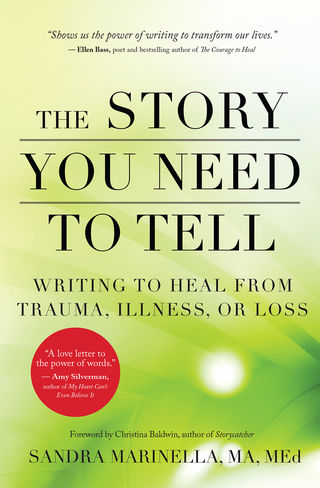Grief
Tell Your Story, Change Your Life
Writing about loss can change your life in a positive way.
Posted August 25, 2017

I've asked Sandra Marinella, MA, MEd, an award-winning writing teacher and the author of The Story You Need to Tell, to provide today's guest post. In it, she shares her expertise about how telling the story you need to tell helps you heal from pain and grief. (Marinella's complete bio below.)
From my work with writers, veterans, and cancer patients, I discovered five stages to writing and healing. These stages can lead to story transformation. They are:
1. Experiencing pain and grief. Grief is the process that helps us adjust to a major life change or a loss — a death, a lost love, an accident, an illness, a rape, or any other setback. There is no set order for what transpires, but initially we might want to ignore or deny what happened because this helps us endure the shock. Later we can experience various emotions such as anger, frustration, and sadness. Sometimes sadness can be so overwhelming, it turns into depression. Often we ruminate or keep replaying what happened in our brains. In the initial throes of a traumatic event, it appears best to embrace silence and avoid writing.
2. Breaking the silence. In this stage we are willing to share our shattered story with others, perhaps with a friend, a counselor, or in our writing. This process may center on simply pouring out painful emotions. Often the release of a painful story can prove quite significant if it has been buried deep inside for a long time. If we can find our voice and free up our broken story, we can begin to work with it.
3. Accepting and piecing together a shattered story. At this stage we reach acceptance of a painful experience. We acknowledge the event or circumstance, as well as the sadness and pain associated with it. With acceptance we begin to move our emotions into a logical framework. Writing can be profoundly helpful here. It allows us to begin making sense of what happened. We can explore various perspectives and gain some insights by distancing ourselves from the pain. Ruminations may continue during this stage.
4. Finding meaning or making sense of a story. In this stage of a setback, we are able to stand outside the experience and see the complete picture. This objectivity allows for a breakthrough of understanding, a complete story, and a feeling of closure. We can reframe a painful experience once we can make sense of it, and writing is a powerful tool in this process. When we gain an understanding of difficult experiences — why they happen and how they will fit into our lives — often the pain and ruminations subside. The incident becomes integrated into our life stories as a finished chapter, allowing us to move forward.
5. Rewriting our story and moving forward. Without the emotional struggles caused by the traumatic incident, we can recover the energy needed to rewrite our stories and move ahead with our lives in fulfilling and creative ways. This often leads to personal story transformation through redefining or reinventing the ways we view ourselves. We often put our renewed energy toward creating something (designing a new room or writing a book) or becoming politically active (advocating for cancer funding or working for gun control). Frequently we focus on helping others face or avoid a similar trauma, while allowing us to create something good and meaningful from the pain we have endured.
Based on the book The Story You Need to Tell. Copyright © 2017 by Sandra Marinella. Reprinted with permission from New World Library. www.NewWorldLibrary.com.

GUEST AUTHOR BIO: Sandra Marinella, MA, MEd, is an award-winning writing teacher and the author of The Story You Need to Tell. She has taught thousands of students and fellow educators and presented hundreds of workshops to veterans, teachers, writers, and cancer patients about the power of our personal stories and writing to heal, grow, and transform our lives. Sandra founded the Story You Need to Tell Project which provides workshops on the power of transformational storytelling and personal writing to increase well-being. Profits from her book support cancer research and provide educational scholarships to veterans and writers. She lives in Chandler, Arizona. Discover more at StoryYouTell.
Copyright (c) 2017 by Sandra Marinella and Susan K. Perry
NOTE: Check out The Bright Hour: A Memoir of Living and Dying, by poet Nina Riggs, for an unusually fine take on writing out your grief. Riggs looked death in the face and made the most of every day she had left. Her book is deeply moving.


